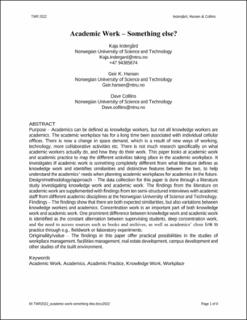| dc.description.abstract | Purpose – Academics can be defined as knowledge workers, but not all knowledge workers are academics. The academic workplace has for a long time been associated with individual cellular offices. There is now a change in space demand, which is a result of new ways of working, technology, more collaborative activities etc. There is not much research specifically on what academic workers actually do, and how they do their work. This paper looks at academic work and academic practice to map the different activities taking place in the academic workplace. It investigates if academic work is something completely different from what literature defines as knowledge work and identifies similarities and distinctive features between the two, to help understand the academics’ needs when planning academic workplaces for academics in the future. Design/methodology/approach – The data collection for this paper is done through a literature study investigating knowledge work and academic work. The findings from the literature on academic work are supplemented with findings from ten semi-structured interviews with academic staff from different academic disciplines at the Norwegian University of Science and Technology. Findings – The findings show that there are both expected similarities, but also variations between knowledge workers and academics. Concentration work is an important part of both knowledge work and academic work. One prominent difference between knowledge work and academic work is identified as the constant alternation between supervising students, deep concentration work, and the need to access sources such as books and archives, as well as academics’ close link to practice through e.g., fieldwork or laboratory experiments. Originality/value – The findings in this paper offer practical possibilities in the studies of workplace management, facilities management, real estate development, campus development and other studies of the built environment. | en_US |
